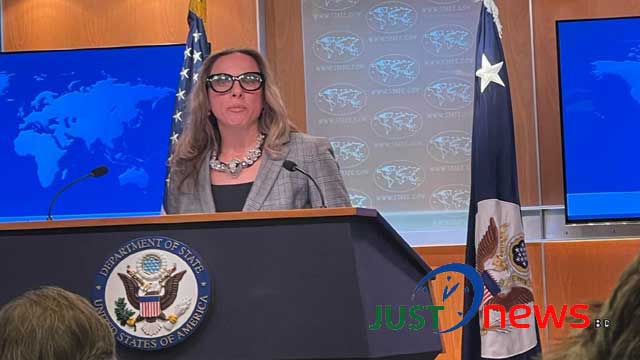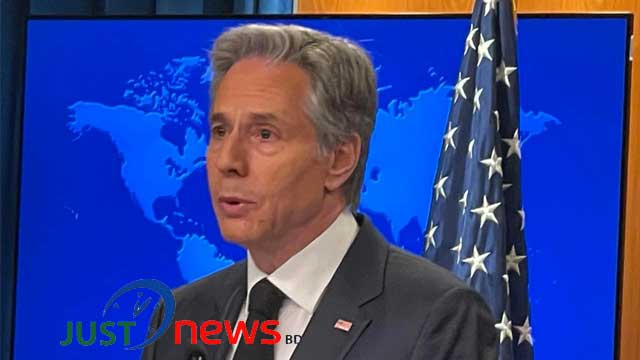The US department of state in released its annual human rights report on Monday stating that 2018 parliamentary election was not considered free and fair by observers due to reported irregularities, including ballot box stuffing and intimidation of opposition polling agents and voters.
The report said that Bangladesh’s constitution provides for a parliamentary form of government that consolidates most power in the Office of the Prime Minister. In a December 2018 parliamentary election, Sheikh Hasina and her Awami League party won a third consecutive five-year term that kept her in office as prime minister. This election was not considered free and fair by observers due to reported irregularities, including ballot box stuffing and intimidation of opposition polling agents and voters.
The annual US report on human rights practices released on Monday. US Secretary of State Antony Blinken unveiled the report at a press conference held at State Department.

The US report said, “There were numerous reports that the government or its agents committed arbitrary or unlawful killings. Police policy requires internal investigations of all significant uses of force by police, including actions that resulted in serious physical injury or death, usually by a professional standards unit that reports directly to the inspector general of police.”
“The government, however, neither released official statistics on total killings by security personnel nor took transparent measures to investigate cases. Human rights groups expressed skepticism regarding the independence and professional standards of the units conducting these assessments and claimed citizens were being deprived of justice.”
About disappearance, the report said, “Human rights groups and media reported disappearances and kidnappings continued, allegedly committed by security services. Between January and September, a local human rights organization reported 16 persons were victims of enforced disappearances. The government made limited efforts to prevent, investigate, or punish such acts. Civil society organizations reported victims of enforced disappearance were mostly opposition leaders, activists, and dissidents.”
The report said, “In 2018 Khaleda Zia was sentenced to 10 years’ imprisonment on corruption and embezzlement charges, which were first filed in 2008. International and domestic legal experts commented on the lack of evidence to support the conviction and suggested a political ploy to remove the leader of the opposition from the electoral process. These experts stated courts were generally slow in considering petitions for bail on her behalf.”
The government used transnational repression to intimidate or exact reprisals against individuals outside its sovereign borders, including against members of diaspora populations, such as political opponents, civil society activists, human rights defenders, and journalists, stated the US report.
According to the press, police and intelligence agencies continued to harass and surveil human rights defenders, civil society leaders, and the family members of critics based outside of the country, read the report.
“In March, Nusrat Shahrin Raka, sister of U.S.-based Bangladeshi journalist Kanak Sarwar, was released on bail after being imprisoned for 160 days. As of December, she remained out on bail, although the cases against her continued and hearings took place every few months. In October 2021, media reported RAB forces arrested Raka on charges of violating the DSA and drug possession. According to the press, Sarwar believed the charges against his sister were retribution for his previous online commentary seen as being critical of the government and said his sister had committed no crime.”
The report further said, :In September media sources reported the detective branch of the national police arrested Nur Alam Chowdhury, brother of London-based weekly Surma editor Shamsul Alam Liton, as reprisal for Liton’s stories critical of the government and his work to organize a demonstration in front of the British parliament on August 30 to mark the International Day of the Victims of Enforced Disappearances.”
“In November the Counter Terrorism and Transnational Crime (CTTC) department of Dhaka Metropolitan Police filed a case against writer and online activist Pinaki Bhattacharya and two others, Mofizur Rahman and Mushfiqul Fazal Ansary, on charges under the DSA of maligning the image of the country. According to the case statement, on October 14, the CTTC noticed a Facebook status posted by Pinaki, who lives in France, that allegedly spread misinformation regarding the police force. Police claimed Rahman, whom they subsequently arrested, shared the misinformation with Ansary and Pinaki, who posted it on social media,” it added.
The US report said, “There were credible reports that for politically motivated purposes, the government attempted to exert bilateral pressure on other countries aimed at having them take adverse action against specific individuals. In September media reported the Ministry of Home Affairs sent Bangladesh missions abroad a list of those committing “anti-state” activities in foreign countries, asking those missions to pressure host governments to take any possible legal action against them.”
About freedom of expression, the US report said, “The constitution provides for freedom of expression, including for members of the press and other media, but the government frequently contravened this right. There were significant limitations on freedom of expression both online and offline. Members of media and bloggers self-censored their criticisms of the government due to harassment and fear of reprisal.”
Authorities, including intelligence services and student affiliates of the ruling party, subjected journalists to physical attacks, harassment, and intimidation, especially when tied to the DSA, which human rights activists viewed as a government and ruling party tool to intimidate journalists, it said.
The report said, “The law provides for the right to peaceful assembly, but the government generally did not respect this right. The law gives the government broad discretion to ban assemblies of more than four persons.”
MN/





